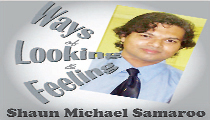Our land is such a blessed place to live. This country provides a real opportunity to build an amazing lifestyle.
Oh, we complain a lot as a people, always finding faults and pointing fingers at scapegoats, blaming others for our plight.
But we live in such a blessed natural landscape that, individually, we could each build a lifestyle that is peaceful, enjoyable and rewarding.

When it rains, the savannah suffers some flooding these days, but the wet grass offers fertile food to the livestock.
This area served once as rice fields, grazing lands and a fishing paradise for folks residing in the East Canje villages, for decades and decades.
In one of those houses in the distance among the trees that one sees from the Bridge road, a senior citizen couple, Ivan Rooney and his wife Baba, entering their 90’s on this earth, these days wake up before sunrise every morning to sit in hammocks and talk, mostly reminiscing about their long years of trod and toil on this earth.
Ivan worked for decades in the cane fields bordering Palmyra Village. Tall and strong, with big feet and large hands and toughened skin, he was a champion cane cutter, famous for hauling massive bundles of raw cane on his bare shoulders to punts in blazing hot midday sun.
A gifted cricketer, husband and father, his days started at 4 am, and ended late in the night.
After hours working in the sugar fields, a brutal, hard job, he would come home to spend hours in his home kitchen garden, filled with an array of vegetables, ground provision and fruit trees. A couple evenings and weekends he would take his fishing net, sewing it where it was torn, and go off alone, a solitary stooped figure, to catch fresh fish.
His family lived on fresh organic fruit, vegetable and fish. They cooked on a mud fireside, three fresh meals a day.
Baba worked just as hard: hand washing clothes and ironing them smooth and crisp with starch using a heavy flat iron heated in red hot coals; waking up at 4 am to start her cooking and sweeping the wooden floors of the house and daubing the mud yard to smooth perfection; working to milk the cows and bring her dozens of head of cattle, sheep, horses and pigs to pasture; walking the village with her five-gallon milk canister on her head hawking milk to neighbours; bathing her kids and combing their hair and oiling their skin and dressing them neatly to go off to the public school where free education awaited them.
Over the years the family built their house, expanding it slowly so that today it’s a sprawling two-storey, three bedroom bungalow-type home.
Today, these two senior citizens sit in their hammocks and talk of those days when the land produced and the people laughed away the harshness of their days. Today, they read the daily newspapers and the Bible and watch TV and puzzle over the red lights at night of the communications tower newly arrived in their ancient village and scratch their heads about their grandson’s blackberry and this talk of the “internet”.
They have lived a full, rewarding life, healthy, long-living, peaceful, accomplished, their five kids all seniors now and career-oriented and living in urban centres. Most of their grandchildren and great-grands live overseas.
Through their years, they lived through a world suffering World War 11, their country gaining political independence, their government banning imported food, the arrival of cell phones (which they both now use), TV, microwave, fridge, electricity, paved roads, street lights, a populated village eating away the vacant land, and several generations growing up. In it all, they lament the social decay they see around them.
In the life of this couple, we see what’s possible for us in this 21st century generation.
A lot of Guyanese live overseas, making up a Diaspora that is scattered across the global village. Most of them long for their homeland. Most remember with nostalgic romantic notions their village life, in Leguan, Wakenaam, Essequibo Coasr, Berbice, Linden, Moruca, Pomeroon, Rupununi, and so on.
With the experience of the bill-paying routine of that awful mundane existence in the developed world, they long for the days they could live like Ivan and Baba. In fact, that’s their retirement dream.
Is such a life still possible? Could we live the kind of lifestyle that Ivan and Baba lived, in this new age of a global knowledge economy? Every household in this country has such a dream at its fingertips.
That dream is within reach. If every household cultivates its own home kitchen garden, including planting parapets with flowers and vegetable plants like pumpkin vines; if every household installs solar energy panels that this Government is working on, or those bio-fuel units that Forbes Burnham introduced; if every household connects to the Internet with a home computer; if every household looks for opportunity for a little business enterprise that supplies the local community with goods of services; if every household owns a bicycle and bikes to and fro on special bike lanes built to support such a transportation culture; if every household could socialize at a local community centre for community family days or local sporting events or recreational fun; if every household could employ the joy of literature in its living; if…. what a beautiful world it would be, to be a Guyanese.
It is so simple and so easy and so reachable for us as a people to, individually, build a lifestyle that is peaceful, rewarding and enjoyable.
If Ivan and Baba did just that in their nine-decade world of such aberrations as communism and WW11, how much more can’t we, who are of the 21st century global knowledge economy, a society of global citizens inter-connected, empowered and standing on the mountain of history’s life lessons?





